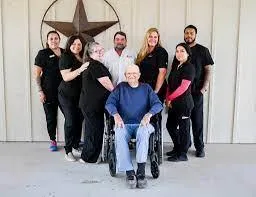Contact Us
Hours of operation: Monday - Friday 8:00 a.m. - 5:00 p.m. CST
At Symphony of Wimberley Assisted Living and Memory Care, our goal is to be accessible to our residents and their families, our future associates and our vendors. To that end, we look forward to hearing from you.
Office Phone
FAX:
Mailing Address
501 FM 3237
Wimberley, Texas
78676-3511
Step 1:
Are you ready to chat? Reach out to our friendly Admissions Staff for more information or download our digital brochure: (512) 243-5852
Step 2:
Schedule a tour to come and visit your future home! You will be so happy that you did so! We're right inside the beautiful Texas Hill country.

RESIDENT CONNECTION
At Symphony of Wimberley Assisted Living & Memory Care, we make it a priority to be available and responsive to the needs of our residents and their families. Resident and Family connections makes it easy for you to speak with a Symphony of Wimberley staff member should the need arise. Current residents and family members can call us with any comments or concerns.
CAREER & HR DEPARTMENT
Seeking a career where your work holds meaning? Discover opportunities to grow alongside passionate individuals dedicated to providing exceptional care. Check out our job openings and find your place within our supportive team. Call today! (512) 243-5852

Contact Symphony of Wimberley
Please email your request using the form below:
OUR ADDRESS
501 Farm to Market 3237
Wimberley, Texas, 78676
COPYRIGHT 2024 SYMPHONY OF WIMBEREY | ALL RIGHTS RESERVED

Facebook
LinkedIn
Youtube